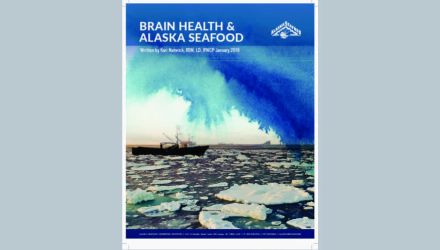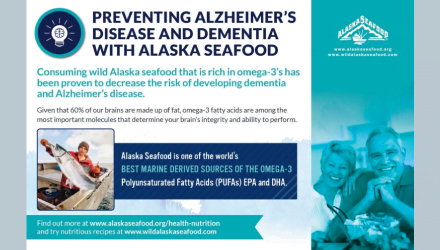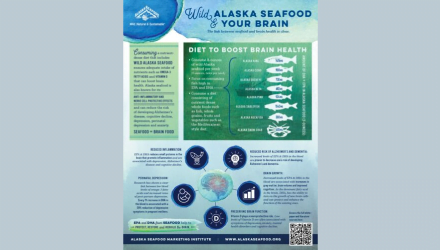Brain Health

Brain Health & Preventing Alzheimer’s Disease and Dementia
The link between seafood and brain health is clear.
Consuming a nutrient-dense diet that includes wild Alaska seafood ensures adequate intake of omega-3 fatty acids and vitamin D that can boost brain health. Alaska seafood is also known for its anti-inflammatory and nerve cell protective effects and can reduce the risk of developing Alzheimer’s disease, cognitive decline, depression, perinatal depression and anxiety.
Seafood = Brain food
Reduced Inflammation
EPA & DHA reduces small proteins in the brain that promote inflammation and are associated with depression, Alzheimer’s disease and cognitive decline.
Perinatal Depression
Research has shown a clear link between low blood levels of omega-3 fatty acids and increased rates of postpartum depression. Every 1% increase in DHA in the blood is associated with a 59% reduction of depressive symptoms in pregnant mothers.
Reduced Risk of Alzheimer’s and Dementia
Increased levels of EPA & DHA in the blood are proven to decrease one’s risk of developing Alzheimer’s and dementia.
Brain Growth
Increased levels of EPA & DHA in the blood are associated with increases in gray matter, brain volume and improved cognition. As the dominant fatty acid in the brain, DHA, has the ability to turn on the growth of new brain cells and can protect and enhance the function of the existing ones.
Preserving Brain Function
Vitamin D plays a neuroprotective role. Low levels of vitamin D are often associated with symptoms of depression, anxiety, mental health disorders and cognitive decline.
Preventing Alzheimer’s Disease & Dementia with Alaska Seafood
Consuming wild Alaska seafood that is rich in omega-3’s has been proven to decrease the risk of developing dementia and Alzheimer’s disease.
Given that 60% of our brains are made up of fat, omega-3 fatty acids are among the most important molecules that determine your brain’s integrity and ability to perform.
- Alaska Seafood is one of the world’s best marine derived sources of the omega-3’s EPA and DHA.
- Consuming seafood as little as once per week decreases risk for both Alzheimer’s and dementia.
- Increased intake of EPA and DHA from seafood increases the production of new brain cells and reduces risk of cognitive decline and Alzheimer’s.
- Omega-3 fatty acids reduce brain inflammation that leads to cognitive decline.
- Omega-3 fatty acids enhance the body’s ability to clear brain plagues.
- The potent effects of DHA are especially protective against genetic risks for Alzheimer’s.
- Many Alaska species are high in EPA and DHA including Alaska salmon, sablefish, herring, rockfish, and cod.



